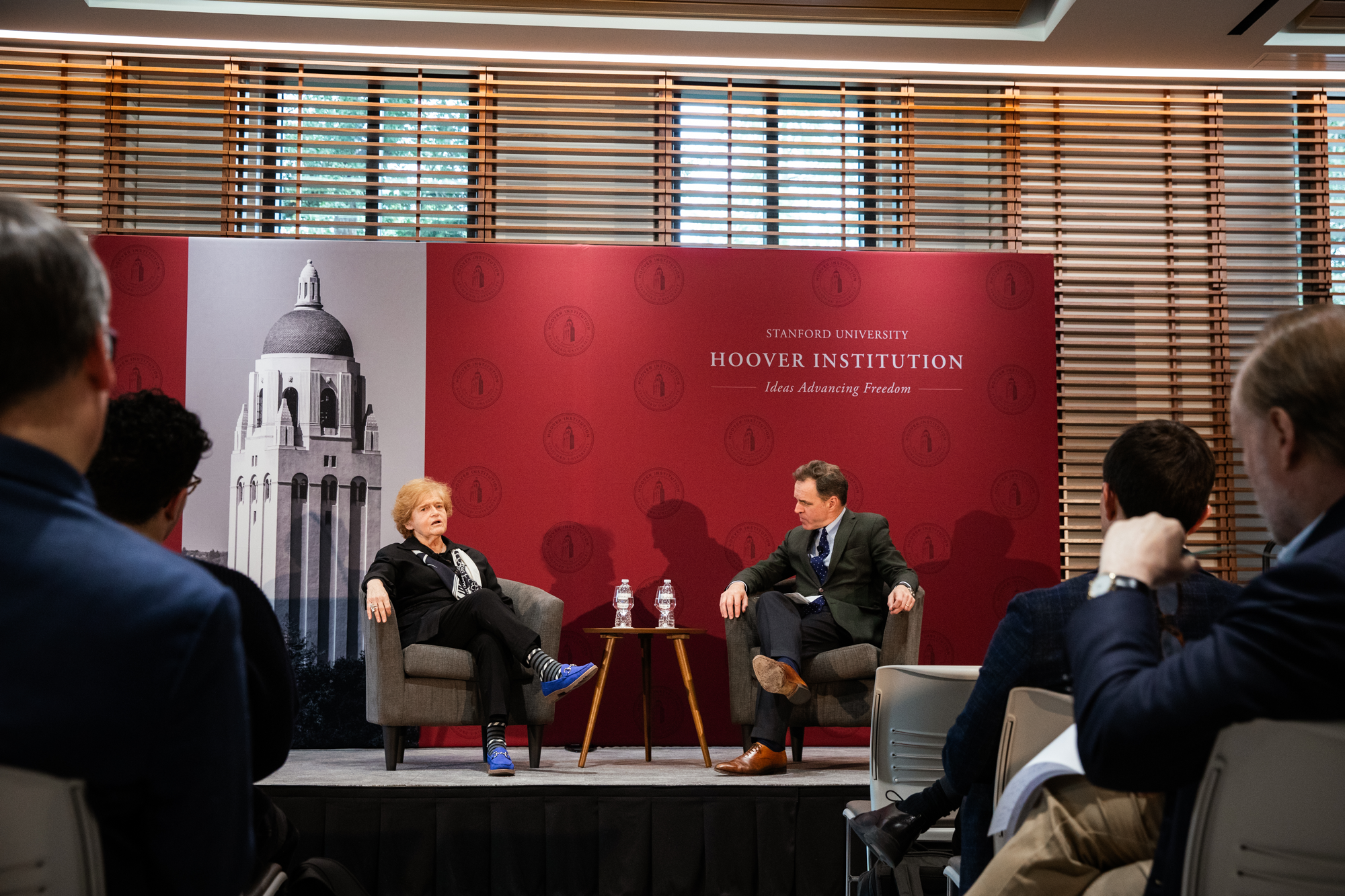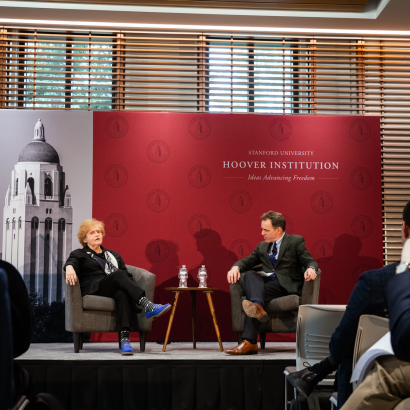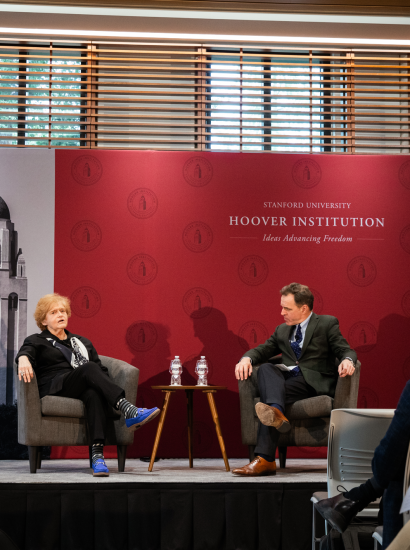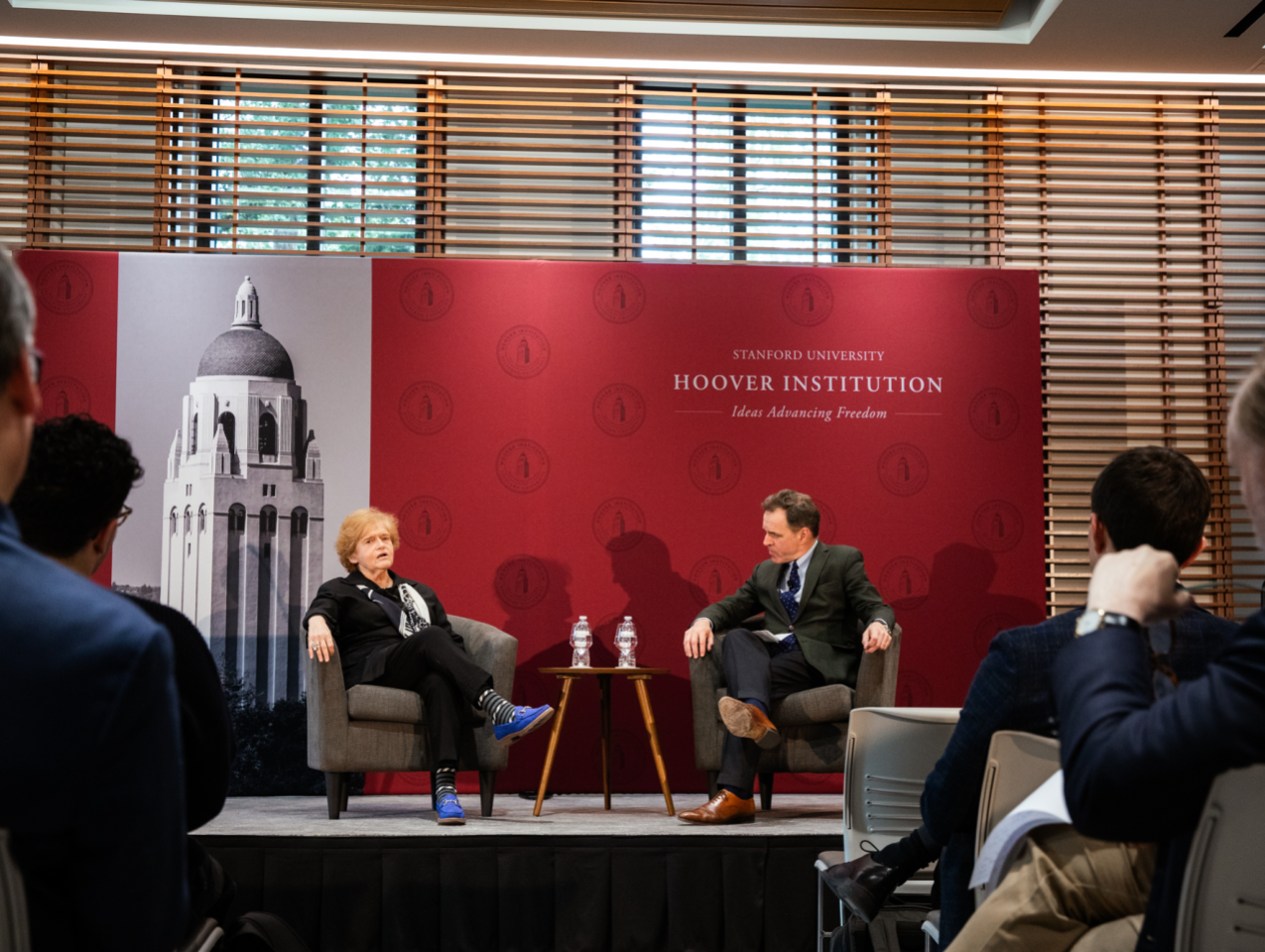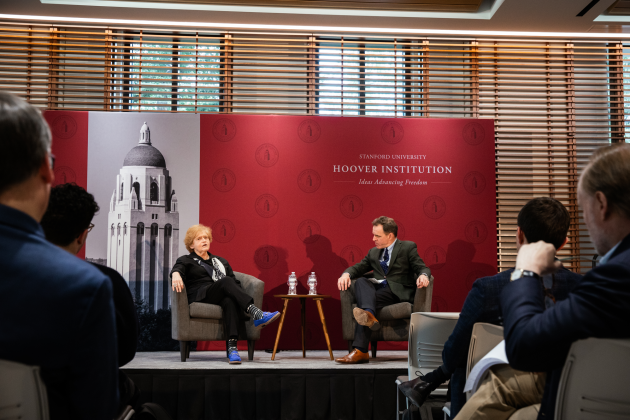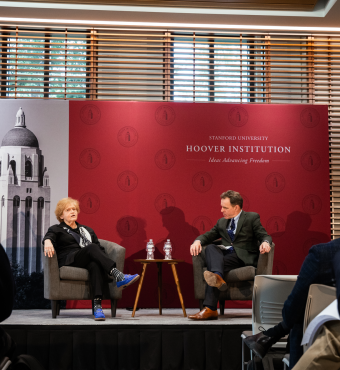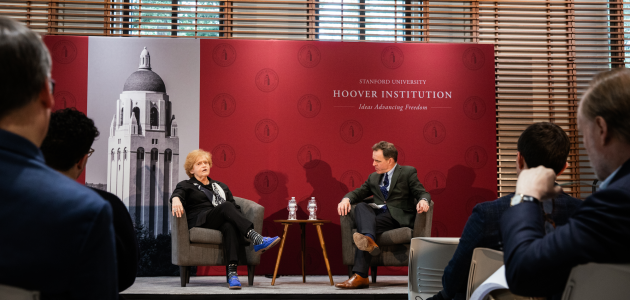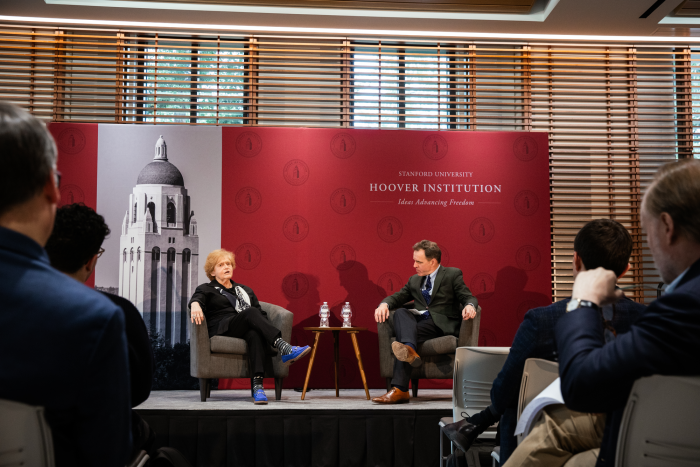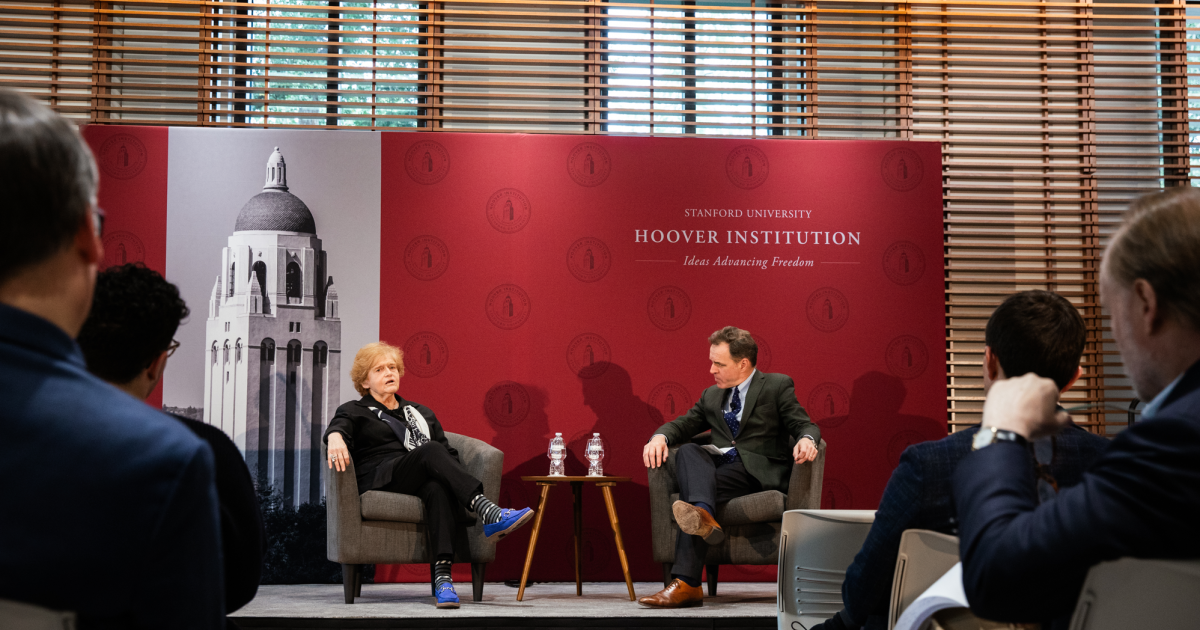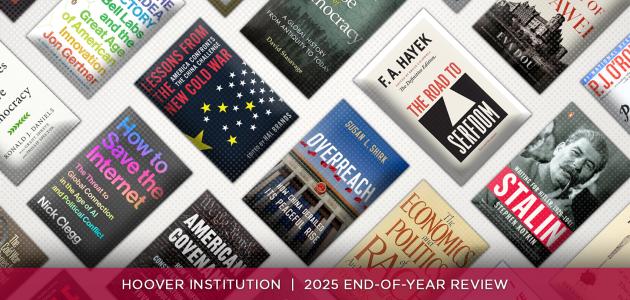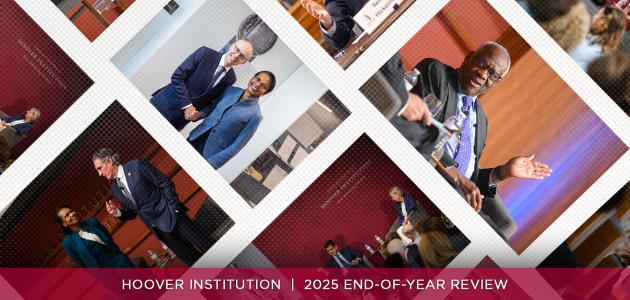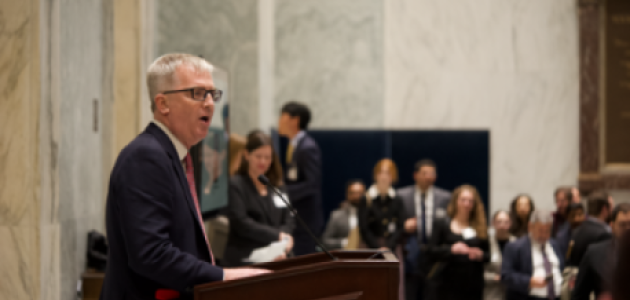In this edition of the Hoover Institution Briefing on Revitalizing History, Hoover fellows explore anti-Semitism, the failures of the Allies in reorganizing the free world, the future of warfare, and the impact of debt on empire. They also use history to inform debates about current challenges such as immigration, law, and justice. Finally, Hoover’s Library & Archives collections offer revelations about the Iranian coup that led to the shah’s rule and about the attack on Pearl Harbor.
Featured Analysis

As Anti-Semitism Has Evolved, Its Roots Remain the Same
The 2025 History Symposium at Hoover saw field-leading experts on anti-Semitism discuss the troubling staying power of this scourge, throughout the globe and through the ages.
The symposium saw a variety of presentations, which traced and illustrated how some elements of anti-Semitism have remained constant for centuries while other aspects have evolved to take different forms.
Senior Fellow Niall Ferguson hosted Deborah Lipstadt, who served as the United States’ special envoy for monitoring and combating anti-Semitism until January. They discussed discrimination against Jews around the world and how American diplomatic power can be used to help combat it.
Other scholars presented papers concerning the historical significance of pogroms to Jewish identity and definitions of anti-Semitism, as well as the differences between anti-Semitism, anti-Zionism, and anti-Israelism.
Read more here.

The Neglect of Asia Was the Great Failure of Yalta (subscription required)
In The Economist, Senior Fellow Stephen Kotkin writes that the meeting of Stalin, Roosevelt, and Churchill at the Yalta Conference in 1945 did not focus nearly enough on the postwar organization and makeup of Asia. He points out that while the three leaders achieved many of their aims regarding Europe, the situation in Asia was discussed in only one of the conference’s eight plenary sessions. As a result, most of the arrangements made to organize postwar Asia (the partitions of the Korean Peninsula, of Taiwan and the Chinese mainland, and of Vietnam) fell apart in later decades. “In all cases, war or civil war broke out to enact, prevent, or overcome actual or prospective partitions,” Kotkin writes. The world was also left sliding into a Cold War, but he says this was likely preferable given the nuclear-tipped alternatives.
Read more here.
Kotkin expands on his thinking about the failures of the Yalta Conference in an interview with Distinguished Policy Fellow Peter Robinson for Uncommon Knowledge.

Debt Has Always Been the Ruin of Great Powers. Is the US Next?
In The Wall Street Journal, Niall Ferguson asks if the US is on a path of terminal decline as a global superpower now that, for the first time, its federal government spends more on debt service costs than on defense. In 2024, the Congressional Budget Office says, the US spent 2.9 percent of GDP on defense but 3.1 percent on net interest payments.
Citing the work of Scottish political theorist Adam Ferguson from the 18th century, along with examples from Spain in the 17th century, France in the 18th century, and the UK in the 20th century, Ferguson says the current US situation invites risk. “History suggests that any sustained period when a great power spends more on interest payments than on military capabilities is likely to see its strategic rivals challenge its position,” he writes.
Ferguson has expanded this argument into a new working paper for Hoover: “Ferguson’s Law: Debt Service, Military Spending, and the Fiscal Limits of Power.”

Future of Warfare Looms Large at Annual Military History Working Group Conference
Scholars interested in the future of warfare gathered at the Hoover Institution on March 7 for the annual Military History in Contemporary Conflict Working Group Conference. Participants discussed the war in Ukraine, the future of America’s nuclear deterrence, and new weapons systems such as drones and hypersonic missiles, as well as the ethics of using AI in warfare. Speakers included Hoover fellows Jacquelyn Schneider, Adm. James O. Ellis, and Victor Davis Hanson. Topics beyond Ukraine included the possibility of conflict with China over Taiwan and the aftermath of the Israel-Hamas war in the Gaza Strip.

Strategika Issue 97: Peace in Ukraine
The latest issue of Strategika, a periodical published by Hoover’s Military History in Contemporary Conflict Working Group, deals with the possible paths to peace in Ukraine after more than three years of total war and more than a decade of hybrid conflict. In this issue, National Security Affairs Fellow Jakub Grygiel writes about the demographic, fiscal and other pressures pushing Ukraine, Russia, the EU and the US towards attempting a ceasefire. Contributor Ralph Peters outlines the many ways in which this war is already a significant defeat for Russia, as it has totally failed to achieve its territorial aims and its economy now resembles a shambolic autarky. Finally, Senior Fellow Barry Strauss offers his view on how the conflict will end, emphasizing the need for the rest of NATO to step up and offer forces to defend some kind of demilitarized zone between Russia and Ukraine.
Highlights

Executive Power and the Alien Enemies Act
In Defining Ideas, Research Fellow Cody Nager explores the origins of the Alien Enemies Act in 1798, which is being applied by the Trump administration to current deportation efforts. At the time of its passage, the law was used to target French revolutionaries who might sneak into the US and foment dissent and instability. Eventually, the Alien Enemies Act and three related acts were seen as an example of federal overreach, but the law somehow remained on the books. “While the Alien Enemies Act of 1798 was shaped by the nation’s nascent partisan competition, heightened transatlantic tensions, and ill-formed political and legal institutions, the debates surrounding its passage reflect concerns beyond the early Republic,” Nager writes.
Read more here.

Law, Order, and the End of the New Deal Consensus
In a new working paper, Hoover Fellow Anthony Gregory writes of Franklin Delano Roosevelt’s “war on crime” during the New Deal that formed an “unprecedented coalition against lawlessness that transcended party, race, and class.” Today, both Democrats and Republicans pledge a greater emphasis on law and order while simultaneously criticizing different aspects of law enforcement power. Looking back to the “golden age of faith in institutions,” from the 1930s to the mid 1960s, Gregory writes about how the professionalization and expansion of the justice system during the New Deal contributed to that golden age and how today’s leaders can rebuild trust in law enforcement and the justice system.
Read more here.
Library & Archives News

Hoover Institution Press Releases Unyielding Resolve: Captive Nations and the Path to Freedom
The Hoover Institution Press has released Unyielding Resolve: Captive Nations and the Path to Freedom, a freedom fighter’s memoir highlighting the role of nationalism in the Cold War resistance to the Soviet regime’s domination over non-Russian peoples of the USSR, and detailing efforts to pass a US law designating Captive Nations Week.
Written by the late Dr. Lev E. Dobriansky and edited by two former high-ranking diplomats and foreign policy experts, including his daughter, Ambassador Paula J. Dobriansky, Unyielding Resolve offers a first-person perspective of the hard-fought battle against Russian imperialist behavior in the twentieth century.
Read more here.

Watch Archives Uncovered: Revealing The Third Reich And The Inner Lives Of Extremists
On March 4, 2025, the Hoover and Stanford community gathered for an event to inaugurate the recently acquired Gerd Heidemann collection, arguably the most important private archive on the history of the Nazi party housed by a university.
An investigative reporter and photojournalist, Heidemann documented the crimes of National Socialism and global conflict more broadly between the 1910s and 1980s. Prior to their arrival at Hoover, these materials were held in Heidemann’s Hamburg basement.
Research fellow and the Taube Family Curator for European Collections Katharina Friedla, visiting fellow Thomas Weber, award-winning Dutch documentary filmmaker Foeke de Koe, and Distinguished Visiting Fellow Norman M. Naimark focused their discussion on Heidemann’s 1979 journey to South America, when undercover he interviewed members of the Third Reich’s inner circle who fled there.
Watch the event recording here and learn more about the collection here.

Browse Season 1 of Reflections from the Hoover Institution Library & Archives
With more than 1.5 million views, the completed first season of Reflections highlights the rich history of primary source materials housed within the Hoover Institution Library & Archives – an estimated one million volumes and over 6,000 archival collections.
Hoover’s expert curators and fellows, including Director Condoleezza Rice, shed light on the context of these collections, their relevance today, and the importance of unrestricted access to them. Stay tuned for more untold stories behind rare artifacts in a second season of Reflections, which will feature Victor Davis Hanson, Elizabeth Economy, Philip Zelikow, Katharina Friedla, Norman Naimark, Jacquelyn Schneider, and more.
Watch the videos here.

Explore Newly Described Postnikov Photograph Album
Research fellow and the Robert Conquest Curator for Russia, Ukraine, and Eurasia Anatol Shmelev introduces the Fedor Postnikov photograph album, a captivating new collection added to the Library & Archives rich holding on Russia and the USSR.
Appointed Vladivostok municipal architect in 1906, Postnikov was responsible for laying the foundations and defining the landmarks of the major city in the Russian Far East.
Learn more about the acquisition here.

Reflections: The August 1953 Coup in Iran
In the featured episode of Reflections, Research Fellow Abbas Milani uses the archival material stored at the Hoover Institution Library & Archives to explore what happened in the August 1953 coup in Iran, when Prime Minister Mohammad Mosaddegh was removed from office and the shah of Iran installed as ruler. Was it an organic national uprising or a CIA-orchestrated plot? There is evidence of journalists and clerics receiving cash payments from the US at that time. Using information located in the million pages that form the Ardeshir Zahedi papers housed at Hoover, Milani shows that the truth about what motivated the coup is more complicated than first thought. Zahedi, an Iranian general at the time of the coup, was the mastermind behind the effort and served as Iran’s prime minister for the first two years of the shah’s reign.
Watch the video here.
Hoover History Lab Spotlight

Joseph Ledford is a Hoover Fellow and the assistant director of the Hoover History Lab at the Hoover Institution, where he also serves as the vice chair of the Applied History Working Group. Ledford is a historian of US foreign relations, and his research and writing focus on the exercise of American power in the world, with a particular emphasis on the Western Hemisphere.
In a recent appearance before the Senate Foreign Relations Committee, Ledford told lawmakers that the US must redouble its efforts to build ties with its neighbors, to prevent hostile foreign powers from meddling in the affairs of states that make up the Western Hemisphere.
Watch, listen to, or read his testimony here.
For more insight on important issues visit www.hoover.org/focus-areas/revitalizing-history







